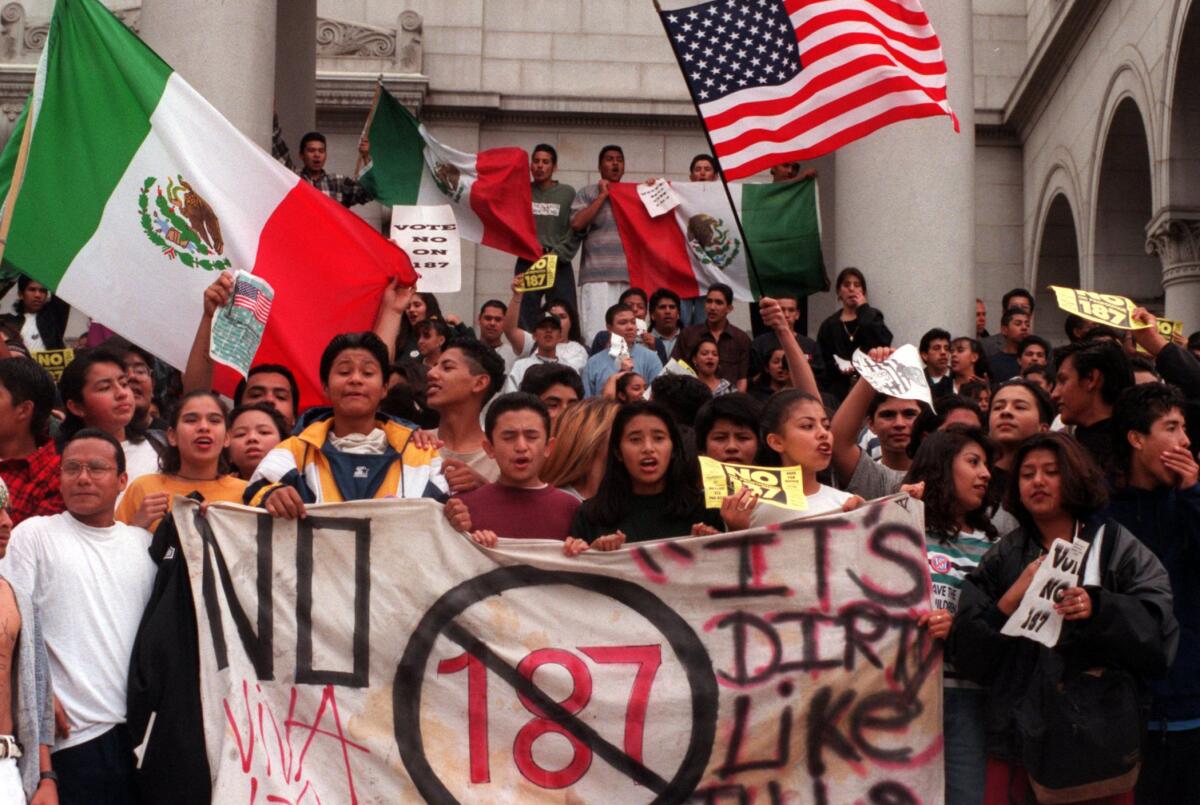Opinion: Californians fell victim to nativist rhetoric 25 years ago. They can’t fool us again

Twenty-five years ago this week, by a 59% to 41% vote, California voters passed Proposition 187, which aimed to block undocumented immigrants from access to non-emergency health care, public education, and other services in the state. Proposition 187 was widely viewed as one of the harshest anti-immigrant measures ever to make it onto a U.S. ballot.
But despite their victory at the polls, the measure’s supporters didn’t triumph in the end. Proposition 187 was quickly blocked by the courts. Moveover, the movement that arose in opposition to the initiative didn’t simply recede after the election day defeat. Its participants went on to transform grassroots organizing, civic engagement and political power in California. The initiative’s passage prompted immigrants and their families — who had long thought they could keep their heads down, do their work, take care of their loved ones and ultimately live out their American dream — to become civically engaged.
Each of us was deeply affected by Proposition 187.
One of us, Antonia, was a young civil rights attorney at the Mexican American Legal Defense and Education Fund when the initiative passed, and she came out of the experience determined to ensure that a law like this would never again pass in California.
The other, Alex, saw how the initiative’s passage prompted his parents, like so many other Latino families, to apply for citizenship after many years of living, working and paying taxes in the United States. They did so not only to protect themselves, but also so they could register and vote. Proposition 187 is a big part of the reason Alex went into public service.
We were not alone in having strong reactions to this misguided initiative. Ultimately, the fight and its aftermath energized a growing Latino population and decimated the state’s Republican Party, turning California into one of the bluest states in the country.
The Latino electorate is often referred to as a “sleeping giant.” Proposition 187 was the alarm that launched its awakening in our state.
The ballot box has been one of the most direct ways in which communities targeted by Proposition 187 have exercised their voice and political power since that time. According to Census Current Population Survey data, in 1994 there were 1.4 million Latinos registered to vote in California; today there are more than 4 million.
Since 1996, the number of Latinos serving in the state Legislature has more than doubled, from 14 back then to 29 today. In 1996, there were no Latino statewide officeholders; there are five. In 1996, the U.S. House of Representatives had four Latino members from California; there are now 14.
Latinos have also played a greater role in legislative leadership, with five Assembly speakers since 1996. And in 2014, a Latino was elected state Senate president pro tempore. This election proved timely, as he led the charge on SB 54 in 2017, which declared California a “sanctuary state.”
Other significant legislative measures in which Latino legislators have taken the lead include AB 540, the California Dream Act, which extended in-state tuition to undocumented students and SB 60, which allows undocumented immigrants to apply for driver’s licenses or state IDs.
The proponents of Proposition 187 attempted to dictate who deserved to be a Californian and who deserved to share in the California Dream. In response, people harnessed their emotions and collective strength to forever change the trajectory of our state. California went from a state apprehensive about immigration to a prosperous place in which most residents embrace diversity. The Golden State has also enacted the nation’s most inclusive set of policies and rights for immigrants.
This movement was driven by Latinos, but it was more than a Latino movement. Change came as a result of Latinos working in coalition with leaders and advocates of all races and ethnicities, including African American and Asian Pacific Islander communities. Together, we have grown from community coalitions into governing coalitions that have led on criminal justice, immigrant rights, economic and environmental justice and other policy issues.
There are lessons to be learned from this journey. Twenty-five years ago, California fell victim to fears stemming from economic insecurity. Some of the state’s political leaders at the time capitalized on that fear by scapegoating immigrants — much as we are seeing today nationally. We know that the discriminatory nativist rhetoric we’re hearing now is not new. But because we have experienced it before, we know how to overcome it.
When immigrants become citizens, their voices soar. When we participate in the census, we refuse to be erased. And when we vote, we become powerful.
Antonia Hernández is president & CEO of the California Community Foundation. Alex Padilla serves as California Secretary of State.
More to Read
A cure for the common opinion
Get thought-provoking perspectives with our weekly newsletter.
You may occasionally receive promotional content from the Los Angeles Times.










